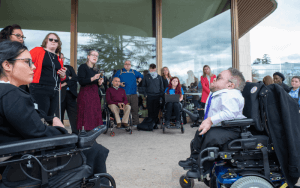
The report by the scrutiny committee, which examines how the Mental Capacity Act 2005 (MCA) has been working in practice, says that social workers, healthcare staff and other professionals are still not aware of the act, and are failing to implement it.
The committee also concluded that the “controversial” deprivation of liberty safeguards (DoLS), added to MCA in 2007 by subsequent legislation, are “not fit for purpose” and should be replaced.
The committee was “very concerned” by what it heard about DoLS, which aim to protect people in care homes and hospitals who are deprived of their liberty for their own safety, but were “poorly drafted, overly complex and bureaucratic”.
Deprivation of liberty could include medication being given against a resident’s will, staff asserting complete control over someone’s movements, or a disabled person being denied access to their friends or family.
The report says that the DoLS are often not being used when they should be and that tens of thousands of disabled people are being deprived of their liberty without the legal protection intended by parliament.
Lord Hardie, Scotland’s former lord advocate and a crossbench peer, who chaired the committee, said: “Worse still, in some cases the safeguards are being wilfully used to oppress individuals and to force decisions upon them, regardless of what actions may be in their best interests.”
He added: “The government needs to go back to the drawing board to draft replacement provisions that are easy to understand and implement, and in keeping with the style and ethos of the Mental Capacity Act.”
The committee’s report also recommends that the government sets up a new independent body to monitor implementation of MCA, and “provide a focus for activity to raise awareness and improve practice”.
The act was introduced to empower and protect people with impairments such as learning difficulties, autism, dementia and brain injuries.
It “placed the individual at the heart of decision-making”, with a disabled person presumed to have capacity “unless proven otherwise”, and individuals to take their own decisions “as far as possible”.
The report says that the act offered “a step change” in the legal rights of those who might lack capacity, with “the potential to transform the lives of many”.
But Lord Hardie said members were unanimous that MCA was “not working at all well”.
He said: “That is because people do not know about the act, or do not understand it, even though many professionals have legal obligations under it.
“Those who may lack capacity have legal rights under the act, but they are not being fulfilled.
“In many cases complying with the act is treated like an optional add-on – nice to have, but not essential. In short, the act is not being implemented.”
The report adds: “A fundamental change of attitudes among professionals is needed in order to move from protection and paternalism to enablement and empowerment.”
Among the committee’s other recommendations, it calls for a higher profile for the act in the training, standard setting and inspections carried out by organisations such as the Care Quality Commission; more resources for the Court of Protection; and a remedy for the inconsistent provision of non-means-tested legal aid in DoLS cases.
The committee also calls on the government to review the criminal offences of ill-treatment and neglect of a person lacking capacity, to ensure that they are fit for purpose.
In 2012,just 85 cases were brought, with 36 resulting in guilty verdicts, even though a “significant” number of the 800,000 people with dementia and 1.5 million people with learning difficulties in the UK are likely to come within the remit of MCA at some point in their lives.
13 March 2014

 Seven years on and no progress on disability rights by UK government, says UN
Seven years on and no progress on disability rights by UK government, says UN UN’s ‘damning verdict’ is ‘vindication’ of fightback against government’s rights violations
UN’s ‘damning verdict’ is ‘vindication’ of fightback against government’s rights violations It was emergency planning that was vulnerable during Covid, not disabled people, inquiry is told
It was emergency planning that was vulnerable during Covid, not disabled people, inquiry is told